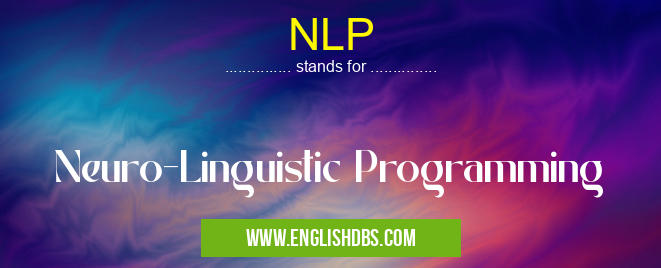What does NLP mean in NEUROLOGY
Neuro-Linguistic Programming (NLP) is a psychological approach that can help individuals to improve their communication and learn more about the ways in which they interact with the world. It combines methods from diverse fields such as neurology, linguistics, and psychology to understand how the brain works. NLP focuses on understanding behavior by looking into patterns of thought, language, and behavior. It can be utilized to increase an individual's ability to influence and achieve long-term success in many different contexts. With NLP, individuals are able to develop self-awareness by learning how to recognize their own thoughts and beliefs in order to effectively manage them. NLP also provides practical techniques for improving communication with others and creating positive relationships.

NLP meaning in Neurology in Medical
NLP mostly used in an acronym Neurology in Category Medical that means Neuro-Linguistic Programming
Shorthand: NLP,
Full Form: Neuro-Linguistic Programming
For more information of "Neuro-Linguistic Programming", see the section below.
Definition
NLP stands for Neuro-Linguistic Programming. In simplest of terms, it is a type of psychotherapy which uses psychological principles of language and sensory processing for better outcomes during treatment or therapy sessions. This form of therapy is used to rewire neurons using language as the driving force behind it in order to control the way a person perceives events happening around them or within themselves (internally).
In addition, some practitioners claim that NLP can help people overcome various psychological problems such as anxiety disorders, depression etc., while others have used it for personal development and goal setting exercises or even spirituality related practices (for instance visualization or meditation).
Benefits Of Neuro-Linguistic Programming
Neuro-linguistic programming (NLP) offers numerous advantages when it comes to helping individuals enhance their lives through greater self-awareness & improved communication skills. People who use these techniques often become more confident & assertive - traits that are essential if one wants success in life regardless of their profession they pursue or what goals they want to achieve! Furthermore, research has also shown that this type of therapy has helped people overcome feelings of stress & depression due to its emphasis on developing positive emotions rather than negative ones when talking about stressful experiences from past or present situations.
Essential Questions and Answers on Neuro-Linguistic Programming in "MEDICAL»NEUROLOGY"
What is Neuro-Linguistic Programming?
Neuro-Linguistic Programming (NLP) is an approach to communication, personal development, and psychotherapy that focuses on the way in which people think, communicate, and interact with each other. It looks at how language, thought patterns, and behavior can be used to influence and change one's own behavior. NLP also seeks to understand how people perceive, process, and represent information.
What are the benefits of Neuro-Linguistic Programming?
Neuro-Linguistic Programming (NLP) has been found to have numerous potential benefits including improved cognitive performance; better self-awareness; improved communication skills; increased emotional intelligence; improved focus & concentration; increased confidence; greater stress management abilities; enhanced problem solving skills and more.
How does NLP work?
NLP works by examining the positive thoughts, patterns, behaviors, language structures, beliefs and attitudes that successful people exhibit in order to model them. By understanding what makes them successful or ‘enabling’ we can make changes towards our own way of thinking or behavior so that we can become more effective ourselves.
Does NLP require a therapist?
No - Neuro-Linguistic Programming tools do not typically require ongoing therapy with a professional. It is more about recognizing which patterns are helpful for you as far as achieving your goals or leading a more satisfying life goes. These patterns can then be applied in any situation without the need for consistent therapeutic support from a practitioner.
Is Neuro-Linguistic Programming scientific?
While there aren’t any studies that prove the efficacy of Neuro-Linguistic Programming techniques with scientific certainty yet, many experts believe it can yield positive results when properly utilized. That said, some universities have even begun offering courses on this topic over recent years which indicates growing interest in its scientific applications.
Who created NLP?
The concept of NLP was developed by Richard Bandler and John Grinder in California during the 1970s as they studied therapists who were notably successful in helping their clients achieve powerful breakthroughs resulting from hypnotherapy sessions. Bandler named this approach “Neuro-Linguistic Programming” after he observed the neurological processes behind language usage that seemed to help create certain states in an individual’s behaviour or emotions.
Can anyone practice Neuro-Linguistic Programming?
Yes - anyone can practice basic concepts of NLP such as breaking down problems into manageable parts or setting achievable goals but if you want to go deeper in terms of using it as a therapeutic tool then it might be beneficial to train under someone who has experience teaching this particular modality. This ensures you will be guided through the process safely while getting all the best out of what programming has to offer.
How long does it take before one starts seeing results by using Neuro-Linguistic programming methods?
It really depends on what specific techniques are being employed as well as what kind of individuals are undergoing training but generally speaking many people report feeling much calmer and less stressed just after 1 session itself while others report experiencing greater clarity around their goals after around 5 sessions or so . Ultimately results tend to vary depending upon each individual’s mindset and commitment level.
Final Words:
Neuro-linguistic programming provides a unique approach towards reaching individual goals through self exploration and conscious awareness building techniques combined with notions from neuroscience & behavioral sciences. The practice brings together various branches under one roof while allowing individuals access powerful resources & tools affordably which will enable them not only lead better lives but also become leaders within any field they choose! Therefore it certainly looks promising when thinking about enhancement both at personal & professional levels!
